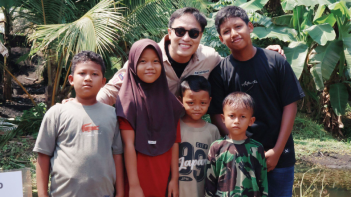Recently the forest fires taking place in Indonesia have made headline news all around the world because of the damage they are doing to the environment both in terms of CO2 emissions and in destruction of forest, peatlands and biodiversity.
The World Resources Institute report that the fires are worse than at any time since 1997. Indonesian Minister of Environment and Forestry Siti Nurbaya Bakar is reported to have said that fires have burned some 1.7 million hectares of land in Sumatra and Borneo.While there is no single cause of the fires and the root causes are complex, deforestation and repeated burning have made the landscape naturally more fire-prone.
The RSPO does not permit the use of fires within certified plantations, except under exceptional and controlled circumstances1, and is committed to working with stakeholders on the ground in order to eliminate deforestation and forest fires on the concessions of RSPO members.RSPO maintains a commitment to transparency and accountability which led us to collaborate with the World Resources Institute (WRI) in 2012 and later in June 2014, WRI released in an accessible format maps for all RSPO certified palm oil concessions on the Global Forest Watch platform (www.globalforestwatch.org) which contains a dynamic online forest monitoring and fire alert system (fires.globalforestwatch.org) that uses satellite thermal imagingto track active fires. The thermal imaging locates hotspots as a guide to the possible location of fires. The IT platform, accessible at www.globalforestwatch.org (GFW), includes boundaries for RSPO certified palm oil plantations according to the audit maps submitted to RSPO up to May 2013.
RSPO is constantly monitoring the hotspots for signs of fires on RSPO certified concessions, receiving a regular updates from GFW. If a potential fire is spotted, a communication is sent out to the RSPO member concerned who is required to go to the location with a GPS-linked camera to verify the actual situation on the ground. If the on-the-ground verification proves there to be a fire, RSPO asks its members to take action and report back on the results of the action. RSPO is also attempting to implement the utmost transparency, reporting monthly on suspected fires and providing updates if we receive any confirmations of fires on RSPO concessions.Global Forest Watch showed on 9 December that for the period 1st November to 30th November 2015, there were a total of 1,643 fire alerts across Sumatra, Kalimantan, Maluka, Papua, Sulawesi, Java and Lesser Sunda of which 4% were located in palm oil concessions (both RSPO and non-RSPO). Within the category of Palm Oil concessions, there were 61 fire alerts, of which only 2 were identified to be within RSPO certified palm oil concessions.
However, it is important to acknowledge that monitoring through the GFW platform faces some important limitations. Firstly, RSPO’s monitoring efforts are hindered by the lack of a single, credible and up-to-date map of Indonesian and Malaysian concessions, providing an unquestionable reference available to the public, which can be used to hold responsible growers accountable. This means that the only viable way to map concessions in these countries is through map data released by stakeholders, principally the companies that own the concessions.
RSPO’s November 2013 General Assembly also passed a resolution requiring the submission of all concession maps of RSPO members, whether certified or not. However, both in Indonesia and Malaysia the legality of this resolution for disclosure of the concession boundary maps has been challenged. This has led to a freeze of the release of the most up to date concessions maps as of 2013.
This is a major source of concern for RSPO, as it constraints its ability to monitor and hold its members accountable.In the past months; it has been working with all parties to facilitate a solution to this problem, but unfortunately no solution has been found so far. The lack of a coherent, credible and accepted set of geospatial map data can generate confusion and misunderstandings regarding the location offorest fires and deforestation episodes and the attribution of responsibilities.
For instance, in the recent Greenpeace report “UNDER FIRE: Indonesia’s fire crisis is a test of corporate commitment to forest protection”, questions were raised concerning two RSPO members’ plantations.
RSPO shared the strong concerns voiced by Greenpeace in the report and immediately wrote to the companies in question to clarify the issue, and RSPO will provide an update next week on their response. At the same time, RSPO and WRI performed further analysis on the claims using a consolidated set (which includes Indonesian Ministry of Forestry maps as well as GFW data). This analysis found significant discrepancies between the Greenpeace data and that of GFW, including particularly that the concessions were located in widely different locations.
This serves as an example of the confusion and alarm to stakeholders that can be the product of inaccurate data. It is essential that data that is released into the public domain be accurate in order to provide certainty and avoid the potentially damaging consequences caused by a lack of information.For this reason, RSPO believes that it is critical that all parties on the ground with relevant data (on forest fires, deforestations, concession boundaries or other) share that information and work together towards the joint solution of an accurate, reliable and shared mapping system, recognised by all parties which will allow forest fires to be effectively combatted.
1Fire should be used only where an assessment has demonstrated that it is the most effective and least environmentally damaging option for minimising the risk of severe pest and disease outbreaks, and exceptional levels of caution should be required for use of fire on peat. This should be subject to regulatory provisions under respective national environmental legislation (Guidance for Criteria 7.7 of the RSPO P&C)
Keep reading
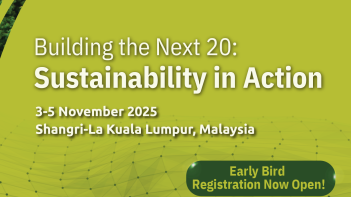
Good News: RT2025 Early Bird Registration Extended!
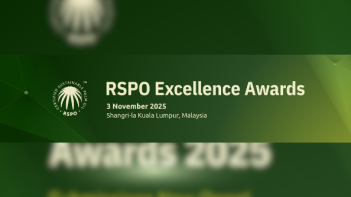
Extension of RSPO Excellence Awards 2025 Submission Deadline!
Call for Expression of Interest: Ghana National Interpretation Task Force for 2024 RSPO Principles and Criteria (RSPO P&C)
Call for Expression of Interest: Côte D’Ivoire National Interpretation Task Force for 2024 RSPO Principles and Criteria (RSPO P&C) and Independent Smallholder (ISH) Standard
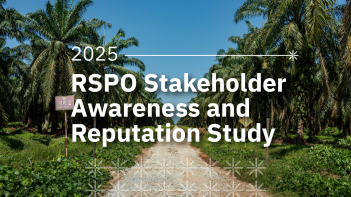
RSPO Gains Global Recognition in 2025 Stakeholder Study
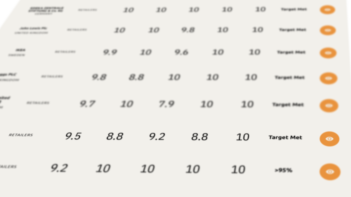
Top 9 Retailers In Europe Committing To Sustainable Palm Oil

Register for RT2025 Early Bird Offer while it lasts!
